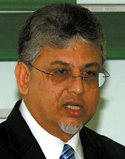It seems to me that we are entering a sustained and hard-fought Information War, global in extent, but with local flavour. The main features of this are the attempted redefinition of Privacy as a defunct notion, right alongside the State’s duty to know all about us, but tell us as little as possible of their own operations. That is the name of the game, so these issues are going to be challenged strongly as we go forward.

The High Court ruled on 14 July 2014 that the Minister of Planning & Sustainable Development must provide the legal advice which was said to have justified the development process at Invader’s Bay. This case was brought by the JCC after the Ministry refused to publish the legal advice obtained in response to our challenge that the Invader’s Bay development process was in breach of the Central Tenders’ Board Act. Given the repeated statements that the legal opinions supported the State’s actions in relation to the CTB Act, the obvious question is ‘Why the secrecy and refusal to publish those opinions?‘
The JCC requested the legal opinions and the letters of instructions under the Freedom of Information Act and the judge applied the ‘Public Interest Test’ in deciding that the public right to that information eclipsed the accepted point as to the existence of ‘legal professional privilege’. There have been many comments on what has been described as a landmark ruling and it appears that the question of just what is an official secret is once again up for discussion.
We are now being told that the right of the client to maintain the confidentiality of legal advice is now under threat, so the State is reportedly considering an appeal of that High Court ruling.
When I consider the principle of legal professional privilege it seems to arise and be justified when parties are at odds with each other, like in some kind of dispute or litigation. Is it possible that the State, which was supposedly devised and operated to serve the common good, could have an interest which is opposed to that of the public? Is that what we are being told, in so many words? All of this makes one wonder just who is the State representing.
In my view, these statements as to client-attorney privilege amount to utter impertinence on the part of high-level Public Officials, paid by the Public, to serve the Public.
This official appetite for secrecy is becoming a disturbing ‘new normal’ of our so-called ‘Information Age’.
The Information War has many fronts, so this week we consider the JCC’s efforts to have the Bernard Report into the Piarco Airport Project published under the Freedom of Information Act. The correspondence tells the story –
Despite several chasers, there has been no substantive response to the JCC’s letter of 6 January 2014.
Some people may even say that these letters should not have been published, but these are public issues to be ventilated.
Reblogged this on Barbados Underground and commented:
The battle to secure transparency by government and the need to exercise greater governance practice is being fought all across the region and the world. Barbados is not excluded.
What is interesting is that Justice Seepersad’s judgement did not restrict itself to just the narrow specifics of this case, but intentionally and explicitly addressed the broader principles of the public’s right to information, the public official’s responsibility to provide it and the threat to public trust that breach of those principles creates. His comments on the effects of the Minister’s involvement in this almost exactly echo the point made by Justice Collymore, then Head of the Integrity Commission, in his report on the first investigation into the Piarco PRIDE project in 1992. I was the Project Finance Manager of the project then and was relieved when the point was made since the management was under siege for resisting the political directorate. The more things change, the more they stay the same…..